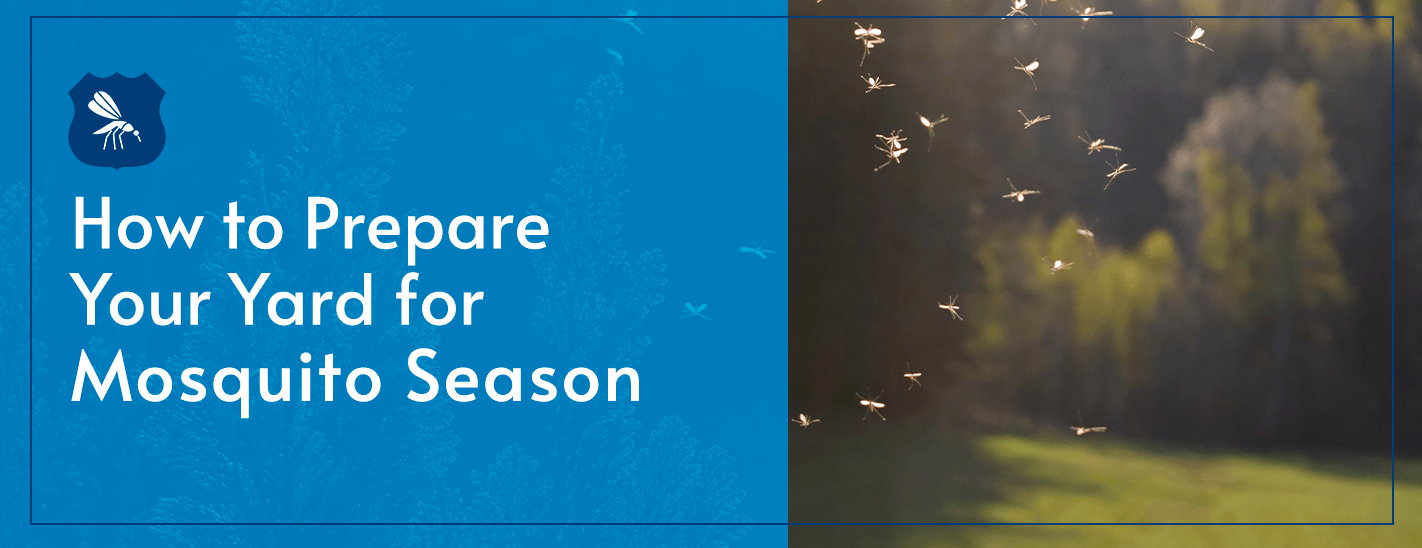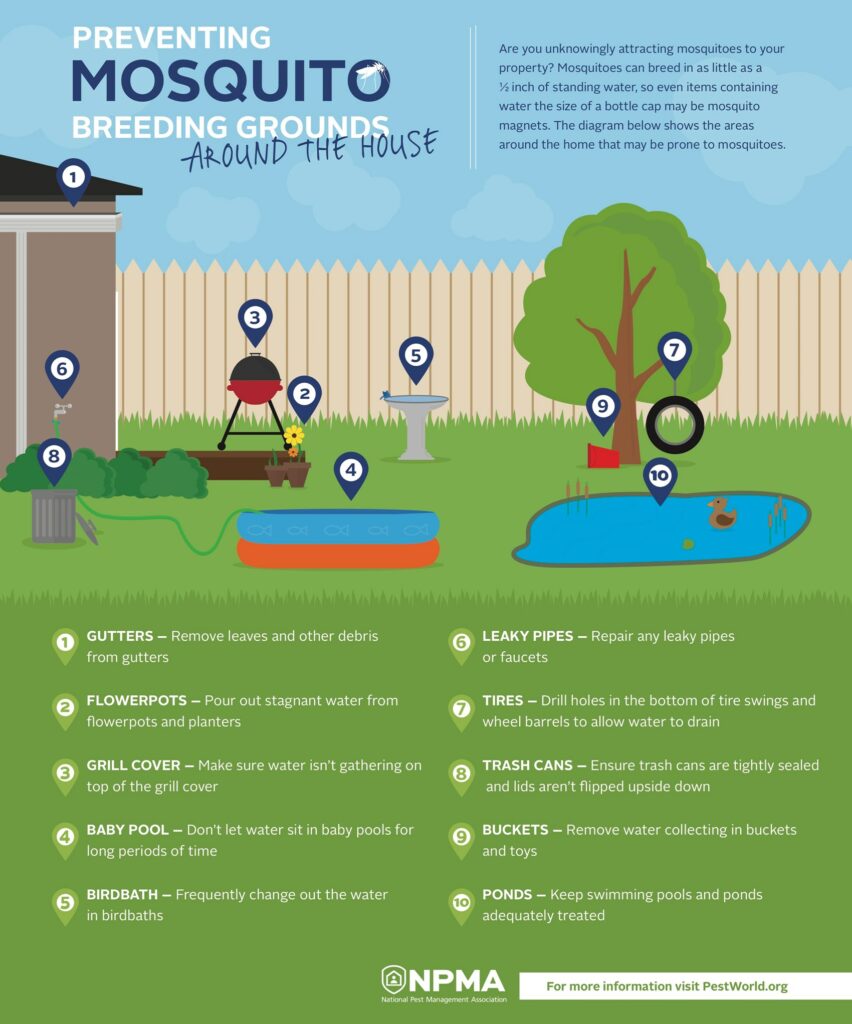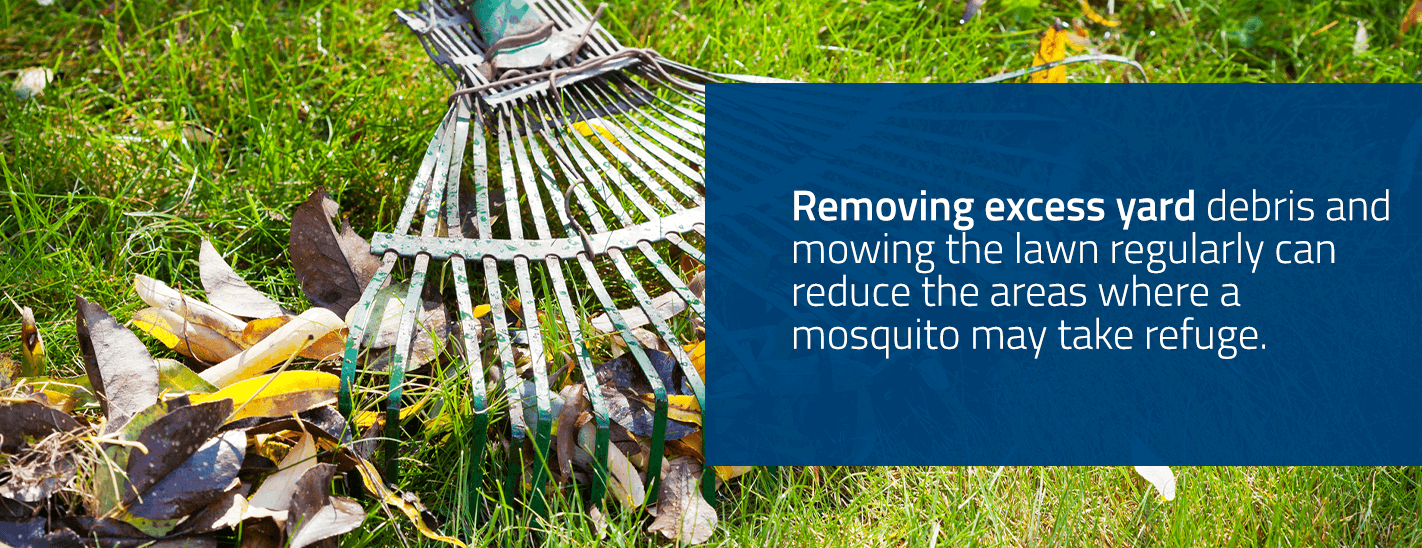How to Prepare Your Yard for Mosquito Season

Mosquitoes live in almost every part of the world. Many types of mosquitoes bite humans and animals, causing itchy, raised welts. Mosquitoes that do not spread diseases are commonly known as nuisance mosquitoes because they represent an annoyance, but are not harmful.
On the other hand, some mosquitoes, known as vectors, can spread dangerous pathogens and germs from animals to people, potentially causing sickness. Mosquitoes can transmit various illnesses, including malaria, Zika virus, yellow fever and dengue fever. Learning how to prepare your yard for mosquito season can help reduce the insect population in and around your home.

5 Ways to Manage Mosquitoes in Your Yard
1. Eliminate Standing Water
Mosquitoes lay their eggs in and around standing or stagnant water. Research has even shown that female mosquitoes may prefer to lay eggs in water stored or collected in human-made containers. Stagnant water often attracts female mosquitoes as an ideal place to deposit eggs until they hatch into mosquito larvae. In some cases, mosquitoes may lay their eggs on the walls of a water-filled container.
These eggs can survive for up to eight months even if they dry out. However, as soon as the eggs get wet, they will hatch and increase local mosquito populations in only one week. Reducing outdoor containers, especially those that regularly collect water, can help prevent mosquitoes from laying eggs in your backyard. Mosquitoes are incredibly resourceful and only need a capful of stagnant water to lay their eggs.
You can add drainage holes to flowerpots and other items to prevent stagnant water from forming. Some typical areas where stagnant water may collect in a backyard include:
- Gardening containers
- Grill covers
- Birdbaths
- Discarded bottles or cups
- Buckets
- Tires
- Trays
- Pools
2. Remove Excess Vegetation
Wind can inhibit a mosquito’s ability to fly well. To combat wind, mosquitoes often need to take refuge under leaves or vegetation and weeds. If your yard has abundant debris, it may attract many mosquitoes to your home, looking for a safe place to stop in windy conditions. Cleaning up your yard and gutters at the beginning of mosquito season can reduce the number of mosquito resting spots.

Yard Debris
A tip for preparing your yard for mosquitoes is to remove any debris from your yard, including fallen leaves, tall grass, compost piles, grass clippings and piles of sticks. This natural debris often serves as a rest stop for mosquitoes, especially in inclement or windy weather. Removing excess yard debris and mowing the lawn regularly can reduce the areas where a mosquito may take refuge. In some cases, pest control services can also help you control your yard’s mosquito population.
Gutter Debris
In addition to general yard debris, fallen leaves and other natural debris may become lodged or stuck within your gutters. If you don’t clean your gutters during the summer, they may attract mosquitoes. Improperly cleared gutters can also result in a buildup of stagnant water, attracting many mosquitoes. In general, you should make sure to clean your gutters at least twice a year, especially at the coming of mosquito season.
3. Choose Beneficial Plants
More than 200 mosquito species live in the continental United States and territories, and 12 of these types can spread pathogens that make people sick. Most mosquito species need stagnant water and prefer humid conditions when breeding and producing mosquito larvae. One of the best mosquito tips is to have beneficial plants and flowers in your garden that can repel mosquitoes and lower the likelihood of these pests visiting your yard.
Many plants that give off a strong fragrance may make your yard less appealing to mosquitoes. Other than being a vital asset during mosquito season, these plants are often beautiful, fragrant and make an excellent addition to a yard and garden. At the beginning of mosquito season, you may want to consider adding beneficial plants to your garden or even plant them in pots and use them to decorate your porch or favorite outdoor area.
Besides traditional plants and flowers, you can grow many cooking herbs that naturally deter mosquitoes.
Some of the most beneficial plants to prepare your yard for mosquitoes include:
- Basil
- Catnip
- Citronella
- Lavender
- Lemon balm
- Lemongrass
- Marigold
- Rosemary
- Peppermint
- Scented geraniums
4. Use an Insecticide
Professional mosquito control can reduce mosquito populations with a few simple treatments and preventive measures. There are many green solutions and insecticides to help repel mosquitoes and eliminate them from your yard. In addition, environmentally sensitive insecticide sprays can treat mosquito hotspots while having a low risk of any adverse side effects for you and your home.
After an initial insecticide treatment, routine maintenance is often necessary to prevent mosquito populations from rising again in your backyard. Because insecticides are a short-term solution, it is typically best to schedule monthly or quarterly treatments to ensure your backyard is comfortable and free of pesky mosquitoes.
Another benefit of professional mosquito control is that these experts can help identify problem areas in your garage and offer advice and simple solutions to reduce the likelihood of attracting mosquitoes. If you are experiencing a large mosquito population in your backyard, you may want to consider reaching out to a professional pest solution provider.
5. Skip the Bug Zappers
A bug zapper attracts insects by emitting UV light that mimics natural sunlight. If your goal is to cut down on harmful insects in your yard, you should be aware that only a few of the insects killed by a bug zapper are hazardous to humans.
Bug zappers are largely ineffective against mosquitoes and biting flies, as these appliances are more likely to target beneficial insects. This inefficiency can lead to various negative effects, including reducing and disrupting songbird populations and causing an environmental imbalance.
Why Are Bug Zappers Ineffective Against Mosquitoes?
Human odors are irresistible to mosquitoes. Because a bug zapper does not offer these same smells, they are vastly less appealing to mosquitoes and other types of biting flies. Only female mosquitoes bite, as they have evolved a long, tubular mouth similar to butterflies. Why might mosquitoes prefer humans to bug zappers?
- Breath: In addition to a tubular mouth, female mosquitoes also have organs called palps, which help them sense odors. These organs help detect carbon dioxide, which is the byproduct humans breathe every time we exhale. On average, a mosquito can sense exhaled carbon dioxide from more than 30 feet away.
- Smell: While sweating, people may release specific odors that also draw mosquitoes’ attention. Some bacteria living in human skin can also emit odors that attract mosquitoes, including ammonia, lactic acid and uric acid. The presence of these scents might explain why some people are more prone to mosquito bites than others.
- Blood: While male mosquitoes only feed on flower nectar, female mosquitoes sustain themselves with blood. A female mosquito requires the protein and nutrients from blood during reproduction and developing her eggs.
Professional Pest Control Services
Pestech Pest Solutions is a leading provider of pest control services dedicated to solving your pest problems with environmentally friendly options and innovative solutions. We are a family-owned and -operated business with a reputation for superior customer service and a personal approach to all our clients’ unique needs. Contact us online today to learn more about our pest management services or schedule an inspection.

